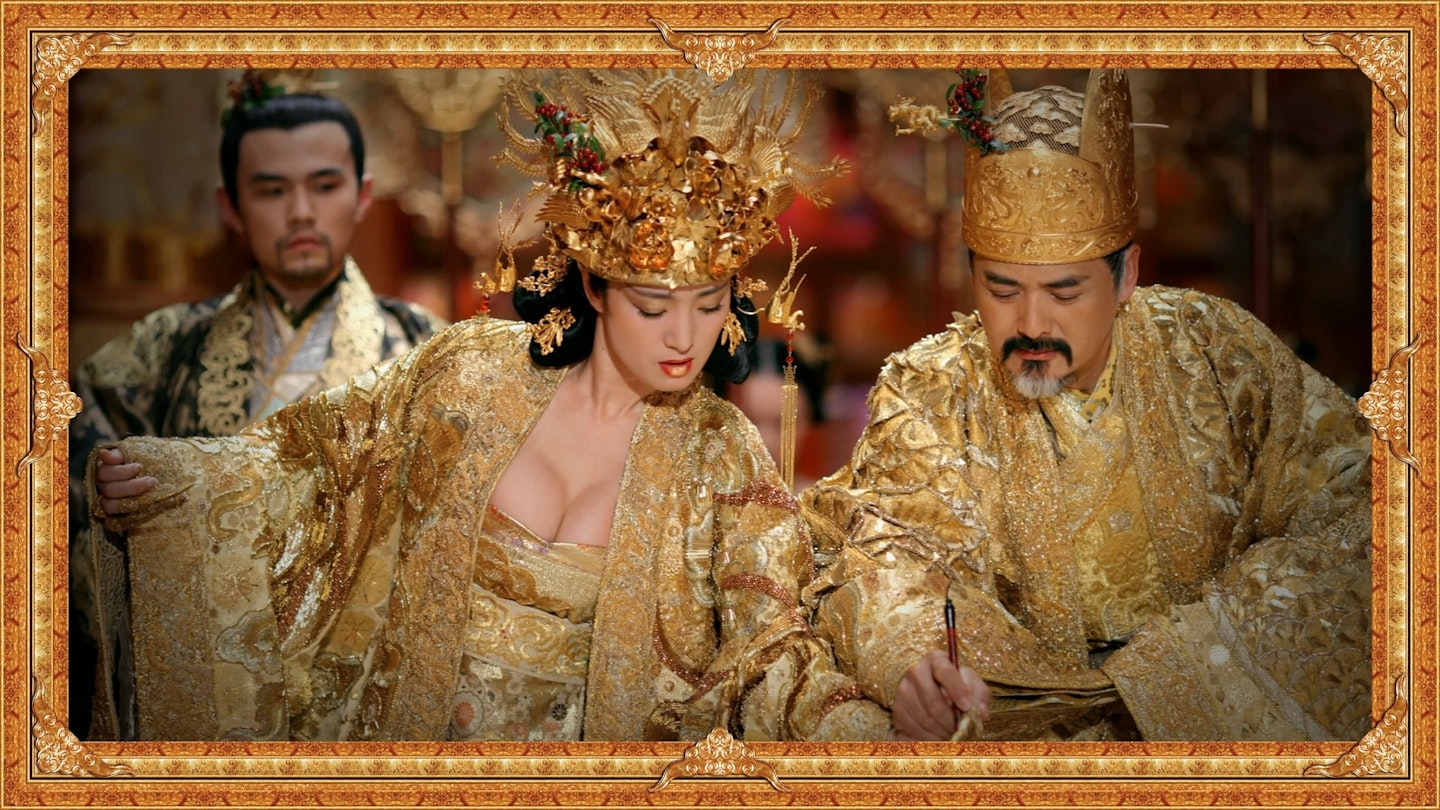The conclusion to Zhang Yimou’s wushu trilogy — following in the tiptoes of those luxuriant fusions of violent Chinese mythology and Mardi Gras fabulousness, Hero and House Of Flying Daggers — commences with the ordered bustle of a new day at the royal palace within a palace within a palace. The place is a giant, boudoir-styled metaphor for lurid and hidden secrets.
Here thousands of fetching female courtiers are strapped into corsets, bottlenecking their waists and forklifting their cleavages like medieval Wonderbras, all for the benefit of His Royal Cruelness, Emperor Chow Yun-Fat. His wife, Her Royal Schemingness Empress Gong Li, who manages the remarkable knack of crocheting golden flowers wearing three-inch false nails, spends much of the time competing with the opulence of her own chest. For his last blast (so he says) of shimmering martial artistry, Zhang boldly accompanies the blurs of swordplay and storms of emotion with the bosomy exuberance of the Benny Hill Show. Little wonder Curse Of The Golden Flower is so unsteady on its feet.
Dripping in melodrama, this tale of the conniving of one mother and three sons to usurp the throne of their brutal patriarch (a past-master in conniving) is delivered at a feverish pitch, its sights set on a Shakespearean delirium of familial dysfunctions. Gone is the heartbroken poetry of Hero for the billowing nonsense of farce.
Then what is a waspish queen to do, rightly suspicious she’s being poisoned by her husband with flecks of a peculiar black mushroom sure to bring on gradual dementia? Amid the plot-drenched, perspiration-soaked first hour, who can say if the potion hasn’t taken effect? There’s a graveyard of skeletons about to come rattling out of the family closet (timorous princes should especially beware which lovely servant girl they choose to unwrap); a Dynasty of sexual intrigue and death-sliding ninjas, designed within an inch of its life.
There is just no stopping Zhang and his production designer Huo Tingxiao. Every frame comes closer to the visual spew of a Woolies’ pick ’n’ mix counter than the plushest palatial galleries history can throw up. Engulfed by light and colour, you don’t know whether to watch scenes or lick them. And don’t get us started on the costumes…
This chromatic trilogy has been read as Zhang’s reaction to growing up in Mao’s grey-cast Communist China, the chance to finally cut loose, but he may have lost control. Even when all the heated doings of the inner sanctums yield to the clang of battle, the battalions of computer-assisted warriors line up like terracotta statues co-ordinated to mummy/daddy factions of gold and silver, in a courtyard stuffed with potted chrysanthemums. It’s extraordinary, but overwhelmingly so. Not to forget the thousand-strong clean-up crew perched behind the scenes, mops and fresh flowers at the ready. History is its own poison: dynasties can be swept aside as swiftly as fallen petals.
Thank whichever heavens, then, for Gong Li, Zhang’s erstwhile muse, former paramour and leading lady for his groundbreaking films: Ju Dou, Raise The Red Lantern, et al. It is her return to his side that keeps the film from pitching face-first into self-parody. Even playing a combination of Lady Macbeth and Joan Crawford she grounds the giddy storyline with real tragedy, a woman clinging on to her sanity. It’s a wonderfully provocative performance, often yoked to headdresses that would give Queen Amidala the eebies.
Sensibly, perhaps, Chow Yun-Fat plays it cool. With a self-satisfied glint, he’s all gleeful double-takes and smug chin-stroking, rightly suggesting he is the daddy. Even by the end, as secrets uncoil with the kind of histrionics reserved for Justin Timberlake gigs, he’s barely let his hair down. Indeed, as a rule of thumb for those venturing inside such a heady, unfettered experience, you can judge any character’s mental wellbeing by the unravelment of their locks. It’s one hell of a bad-hair day.
